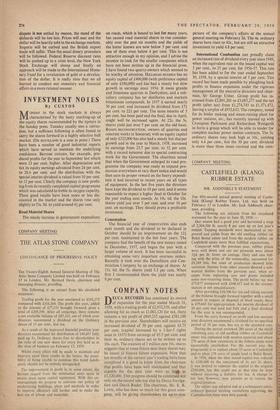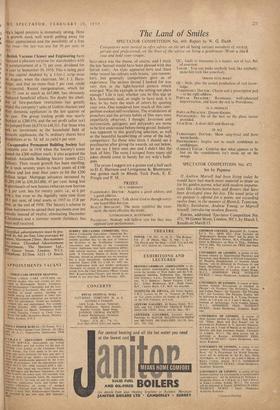COMPANY NOTES
DECCA RECOMIS has continued its record of expansion for the year ended March 31, 1958, with a trading profit of £2,952,539, and after allowing for as much as £1,002,120 for tax, there remains a net profit of £869,255 against £581,188 in the previous year. Shareholders will receive an increased dividend of 50 per cent. against 43.75 per cent. (capital increased by a 1-for-5 rights issue in 1957) from earnings of 85.5 per cent. and their 4s. ordinary shares are to be written up to 10s. each. The creation of 1 million new 10s. shares suggests that at some future date these shares may be issued to finance future expansion. Now that ten months of the current year's trading have been completed it is good to know from the chairman that profits have been well maintained and that exports for the -vast year were as hi. as £5,320,000. This progress should be continued not only on, the record side but also by Decca Naviga- tion and Decca Radar. The chairman, Mr. E. R. Lewis, who has done so much for this great com- pany, will be giving shareholders, an up-to-date
picture of the company's affairs at the annual general meeting on February 26. The 4s. ordinary shares have risen to 42s., but are still an attractive investment to yield 4.8 per cent.
International Combustion can proudly claim an increased rate of dividend every year since 1949, when the equivalent rate on the issued capital was 5 per cent., to 25 per cent. for 1956-57. This rate has been added to for the year ended September 30, 1958, by a special interim of 5 per cent. This record has been made possible by ploughing back profits to finance expansion under the vigorous management of the executive directors and chair- man, Sir George Usher. Group profit has in- creased from £2,801,201 to £3,085,277 and the net profit (after tax) from £1,274,745 to £1,371,472, leaving a surplus of £952,632. The company, noted for its boiler making and steam-raising plant for power stations, etc., has recently teamed up with Crompton Parkinson and Richardson Westgarth to form a group which will be able to tender for complete nuclear power station contracts. The 5s. ordinary shares may look high at 34s., yielding only 4.4 per cent., but the 30 per cent. dividend is more than three times covered and the corn-
toy's liquid position is immensely strong. Here a growth stock well worth putting away for irther appreciation and the possibility of a free :rip issue-the last was one for 50 per cent. in )55.
British Vacuum Cleaner and Engineering have reduced a pleasant surprise for shareholders with it announcement of a 7+ per cent. dividend for le year to September 30, 1958. This is being paid n the capital doubled by a 1-for-1 scrip issue 1st August, when the chairman, Mr. J. J. Ham- 'ridge, said that no more than 5 per cent. could 'e expected. Recent reorganisation, which for 956-57 cost as much as £65,000, has obviously Itoduced beneficial effects. No doubt the aboli- inn of hire-purchase restrictions has greatly lel ped the company's sales of Goblin cleaners and ether domestic appliances in the last quarter of he year. The group trading profit was nearly ioubled at £200,956, and the net profit (after tax) lits jumped from £6,874 to £48,311. For those who kek an investment in the household field of omestic appliances, the 5s. ordinary shares have ssibilities at 6s. 3d. xd. to yield 6 per cent.
Co-operative Permanent Building Society had
notable year in 1958 When the Society's assets ssed the £200 million mark; it also acquired the ottish Amicable Building Society (assets £22+
ill ion). Their recent growth has been startling, or it took seventy years to reach assets of £100 Million and just over four years to hit the £200 Million target. Mortgage advances increased by (1,201,100‘at £30,265,000, 45 per cent, being lent !0 purchaser's of new houses (who can now borrow it t i per cent. less for twenty years, i.e., at 6 per cent.), but even so the liquidity ratio rose from '14.5 per cent, of total assets in 1957 to 15.8 per Cent, at the end of 1958. The Society's scheme to allow borrowers to spread their payments over ten llonths instead of twelve, eliminating December Christmas) and a summer month (holiday), has been well received.



































 Previous page
Previous page